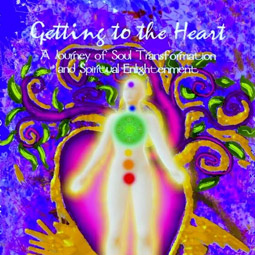Forgiveness
The past, present, and future each exist within one another. They are the makeup that creates our picture of life and ourselves. Our past cannot be put behind us by us not thinking about it. Our training has been that by stuffing our emotions we can put things out of our mind.
Stuffing ones emotions year after year causes one to feel alienated and distant. It is all right to put our feelings on the back burner for a little while, but too often, we forget to bring them back to the foreground. This can cause us to lose perspective of self and others around us.
How well we process and understand our feelings determines our emotional health. Due to the emotional distress most individuals have suffered in life, they believe themselves unable to trust their feeling self.
When we push the emotions deep into the recesses of our being we isolate and insulate, losing our ability to deal with the intimate emotional situations in our personal lives. This in turn causes us loss in our ability to use logic and reason to resolve emotional situations in our lives.
In order to achieve good health or peace of mind it is necessary for us to bring our emotions into balance with our reason. Denying how we feel about different situations in our lives can be very self-destructive. We think that by stuffing our emotions they will go away.
Unexpressed emotions simply lie beneath the surface smoldering, waiting for an opportunity to emerge. Repressed emotions will eventually find a way of showing themselves. They are often released unexpectedly in a fit of anger, along with crying or yelling for no apparent reason. They can create mood swings and suicidal or homicidal thoughts. Depression, anxiety, stress, uncontrollable laughter, and crying are all symptoms of pent up emotions. We label this as mental illness and doctors prescribe drugs and other treatments. Nevertheless, no matter what we call it, the fact remains it is repressed emotion.
Often repressed emotions also manifest themselves through physical illness. Heart disease, arthritis, obesity, cancer, diabetes, and many other illnesses are more connected to the emotions than we think. Sometimes the result of repressed emotions can be terminal.
Forgiveness is the most powerful tool we have for dealing with repressed emotions. We all feel victimized by the seeming injustices that take place in our lives. Few of us know how to react to or process these feelings.
By learning to forgive yourself, other people, and the circumstances that have occurred in life, your experience of life becomes transformed. This transformation takes place not by us paying lip service to forgiving but by seriously delving within ourselves to admit that we are the one who has been repressing our emotions. We must each make a conscious effort to do whatever it takes to make peace with ourselves and the past.
If you carry a feeling of hatred around inside of yourself for twenty years or so, it eats away at you daily; not those you believe you hate. By harboring an intense feeling of hatred, you begin to attract others into your life that are harboring the same feeling. Together, you now feed off each other’s hatred and begin finding fault with one another. This happens because like energy attracts, and likely, you will soon find a reason to hate everyone you try getting close to.
When humans feel victimized by life and hold onto this emotional energy, they then attract other people into their lives who also are victims. By feeding off each other’s emotional energy, they eventually become one another’s victims. This is the law of universal attraction in action.
Some people feel it is easier to forgive another person for a wrongdoing than it is to forgive their self. Others find it easier to forgive their self. True emotional healing can take place only when we are willing to forgive both the other and ourselves. We must not simply tell ourselves that we forgive; we must know that we have forgiven through the balance in our feelings.
True forgiveness does not come easily and may take time. You will know when you have truly forgiven. When you can search your heart and your mind and no longer experience ill feelings toward a situation or another person, you have reached the pinnacle of true forgiving.
Following are exercises to aid you with forgiveness processing. You may do these exercises while sitting in a chair or lying in bed at night before going to sleep. These exercises should be used daily if possible.
Exercise I: Life Revue
While lying in bed at night, begin to revue your life. Start at the age you are now and continue back one year at a time. Say your age as you do this (such as 49) and simply see what memories come. When you come to a memory about yourself that does not feel good, it is time to process with forgiving. Simply allow yourself to receive clearly the image of what the situation was about and begin to forgive yourself for the feelings in the situation. Then see if you can understand how to forgive the other person or people involved.
When no more memories come for that year, go back one more year (e.g., age 48), and so forth. You do not have to do your entire life in one sitting. You can stop and pick up later where you left off. When you stop the first session, write down the age at which you stopped. When you do the Life Revue exercise again, begin at the age where you previously stopped. This exercise may take many nights or days to work with. So, be patient.
Exercise II: The Sacred Path
Put on some soothing, relaxing music and start letting go of all your daily stress. Feel the stress moving down your body, starting at the top of your head and moving down out through your arms and hands, then down your torso and legs, and out through your feet. Begin to drift.
Breathing comfortably, let yourself float to a peaceful place somewhere in nature. This spot is filled with greenery and earth’s beauty. Spend a few moments enjoying your new surroundings, and see a traveler guiding you to a pathway. Travel this pathway and meet yourself as a child. Be gentle with yourself and the child. Let the child part of yourself express its feelings to you. Get the child to forgive you and you him/her. Forgive yourself as well. Together, recall the memories of the past that need to be resolved and work to resolve them together.
This exercise should be done many, many times. You will find that forgiveness is not an easy task to accomplish. Keep at it until you feel you are making headway and understand the process. Do not be afraid to pray or ask for help as you work on yourself.







No Comments
Be the first to start a conversation